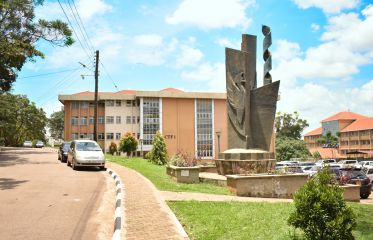Breaking News
- Ground Breaker Full time Scholarship for girls to study Software Engineering 2025 Intake ...Read More
- Ministry of Education And Sports Algerian Vocational Training Scholarships for 2024-2025 AY ...Read More
- Ministry of Education and Sports Advert for the Algerian Government Scholarships for 2024-2025 ...Read More
- Uganda Dev Summit 2024 Live Stream ...Read More
- Malyasian Government Scholaship Under Malyasian Technical Cooperation Program ...Read More
- Graduate Intern - Information Systems Engineering (2 Positions) ...Read More
- 32,000+ Early Educators Needed in Canada, Apply to study in Canada ...Read More
- 20% of the World’s New Jobs are in Hospitality and Tourism - Study Tourism in Canada ...Read More
- Indian Government Scholarships for 2024-2025 Academic Year ...Read More
- Makerere University and MUBS Undergraduate Admission Lists under Government Sponsorship 2024-2025 ...Read More
Postmaster and mail superintendent
Plan, direct, or coordinate operational, administrative, management, and supportive services of a post office; or coordinate activities of workers engaged in postal and related work in assigned post office. Sample of reported career titles: Computerized Forwarding System Supervisor, Distribution Operation Supervisor (SDO), Distribution Operations Manager, Mail Delivery Supervisor, Postal Supervisor, Postmaster, Postmaster Relief (PMR), Remote Encoding Center Manager, Remote Encoding Operations Supervisor
Add to FavouritesThe Postal Service handles mail which makes the typical post office a very busy place. Making sure that everything is operating properly is the responsibility of postmasters and superintendents. These senior managers oversee all aspects of the post office, from the mechanical systems that move the mail to the personnel that comprise the staff. This is a career that requires solid business, management, and interpersonal skills.
Part of the job is hiring and training employees, as well as evaluating their performance. Dealing with customer complaints calls for a friendly, even-natured disposition comfortable with problem-solving. Critical thinking is also important.
Daily tasks
1. Hire and train employees, and evaluate their performance.
2. Negotiate labor disputes.
3. Prepare employee work schedules.
4. Prepare and submit detailed and summary reports of post office activities to designated supervisors.
5. Resolve customer complaints.
6. Organize and supervise activities such as the processing of incoming and outgoing mail.
7. Direct and coordinate operational, management, and supportive services of one or a number of postal facilities.
Key knowledge areas
Administration and Management: Knowledge of business and management principles involved in strategic planning, resource allocation, human resources modeling, leadership technique, production methods, and coordination of people and resources.
Customer and Personal Service: Knowledge of principles and processes for providing customer and personal services. This includes customer needs assessment, meeting quality standards for services, and evaluation of customer satisfaction.
English Language: Knowledge of the structure and content of the English language including the meaning and spelling of words, rules of composition, and grammar.
Production and Processing: Knowledge of raw materials, production processes, quality control, costs, and other techniques for maximizing the effective manufacture and distribution of goods.
Public Safety and Security: Knowledge of relevant equipment, policies, procedures, and strategies to promote effective local, state, or national security operations for the protection of people, data, property, and institutions.
Clerical: Knowledge of administrative and clerical procedures and systems such as word processing, managing files and records, stenography and transcription, designing forms, and other office procedures and terminology.
Education and Training: Knowledge of principles and methods for curriculum and training design, teaching and instruction for individuals and groups, and the measurement of training effects.
Personnel and Human Resources: Knowledge of principles and procedures for personnel recruitment, selection, training, compensation and benefits, labor relations and negotiation, and personnel information systems.
Key skills
Critical Thinking: Using logic and reasoning to identify the strengths and weaknesses of alternative solutions, conclusions or approaches to problems.
Speaking: Talking to others to convey information effectively.
Active Listening: Giving full attention to what other people are saying, taking time to understand the points being made, asking questions as appropriate, and not interrupting at inappropriate times.
Time Management: Managing one's own time and the time of others.
Monitoring: Monitoring/Assessing performance of yourself, other individuals, or organizations to make improvements or take corrective action.
Coordination: Adjusting actions in relation to others' actions.
Social Perceptiveness: Being aware of others' reactions and understanding why they react as they do.
Management of Personnel Resources: Motivating, developing, and directing people as they work, identifying the best people for the job.
Postmasters and superintendents purchase equipment and supplies and prepare reports. Many work their way up through the government postal service. A high school diploma is necessary to enter at the ground level. Additional training can be learned on the job. Hours are regular, but the postmaster may have to be flexible during high-volume seasons.
The post office is an indispensable link in our chain of communication.
































































































